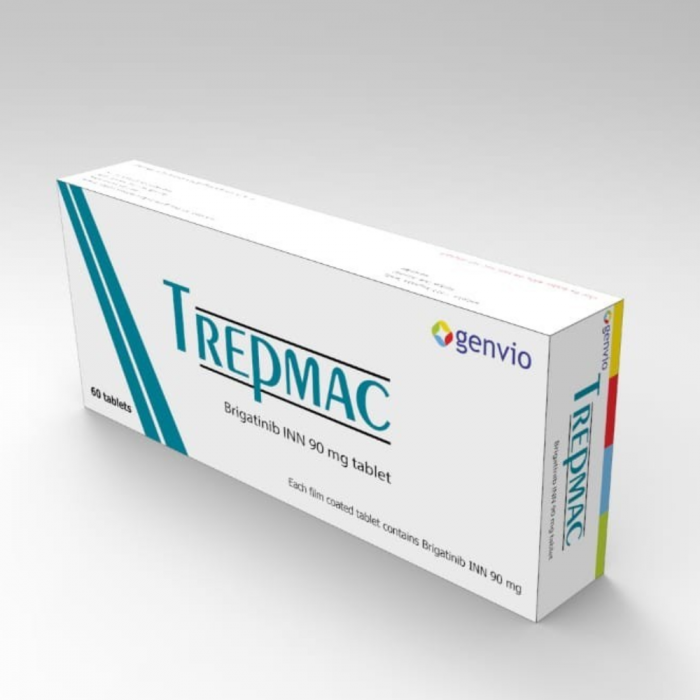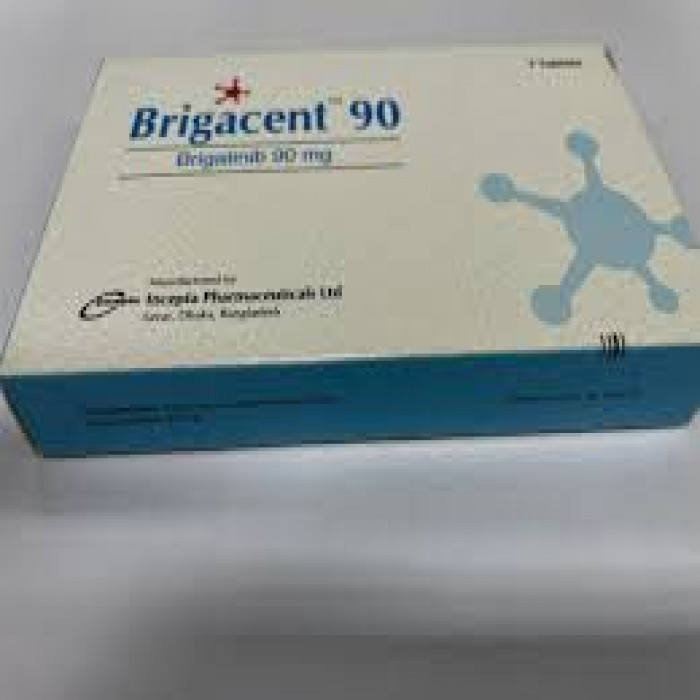
✔ 100% Authentic Product
👁️ Currently Viewing 1825
Brigacent 180mg Tablet 7pcs
Brigatinib is indicated for anaplastic lymphoma kinase (ALK)-positive metastatic non-small cell lung cancer (NSCLC) in patients who have progressed on or are intolerant to crizotinib
Discount
Price: ৳ 13,300
MRP:
৳
14000
5%
Off

100% Genuine Products, Guaranteed

Safe & Secure Payments, Always

Fast, Secure & Efficient Delivery

Proper Packaging
 Cash on Delivery - All over Bangladesh
Cash on Delivery - All over Bangladesh Regular Delivery - 12-24 Hours, Dhaka City* Charge Tk.39-59
Regular Delivery - 12-24 Hours, Dhaka City* Charge Tk.39-59 Regular Delivery - 24-48 Hours, Other Cities* Charge Tk.99-110
Regular Delivery - 24-48 Hours, Other Cities* Charge Tk.99-110
 ফ্রি ডেলিভারিঃ - ৯৯৯ টাকা+ অর্ডারে, ঢাকা
শহরে
ফ্রি ডেলিভারিঃ - ৯৯৯ টাকা+ অর্ডারে, ঢাকা
শহরে ফ্রি ডেলিভারিঃ - ২৯৯৯ টাকা+ অর্ডারে, ঢাকার
বাহিরে
ফ্রি ডেলিভারিঃ - ২৯৯৯ টাকা+ অর্ডারে, ঢাকার
বাহিরে
100% Genuine Products, Guaranteed
Safe & Secure Payments, Always
Fast, Secure & Efficient Delivery
Proper Packaging
 Cash on Delivery - All over Bangladesh
Cash on Delivery - All over Bangladesh Regular Delivery - 12-24 Hours, Dhaka City* Charge Tk.39-59
Regular Delivery - 12-24 Hours, Dhaka City* Charge Tk.39-59 Regular Delivery - 24-48 Hours, Other Cities* Charge Tk.99-110
Regular Delivery - 24-48 Hours, Other Cities* Charge Tk.99-110 ফ্রি ডেলিভারিঃ - ৯৯৯ টাকা+ অর্ডারে, ঢাকা
শহরে
ফ্রি ডেলিভারিঃ - ৯৯৯ টাকা+ অর্ডারে, ঢাকা
শহরে ফ্রি ডেলিভারিঃ - ২৯৯৯ টাকা+ অর্ডারে, ঢাকার
বাহিরে
ফ্রি ডেলিভারিঃ - ২৯৯৯ টাকা+ অর্ডারে, ঢাকার
বাহিরে
✅ Description:
Non-small cell lung cancer (NSCLC) is a type of lung cancer in which malignant cells form in the tissues of the lung. It is one of the two main types of lung cancer, the other being small-cell lung cancer. NSCLC accounts for approximately 85% of all lung cancer cases.
Types of Non-Small Cell Lung Cancer: There are several subtypes of NSCLC, each characterized by the type of cells involved. The main types include:
- Squamous Cell Carcinoma: Arises in the thin, flat cells lining the inside of the lungs.
- Large Cell Carcinoma: Can originate in various types of large cells.
- Adenocarcinoma: Begins in the cells that line the alveoli and produce substances like mucus.
Other Less Common Types are adenosquamous carcinoma, sarcomatoid carcinoma, salivary gland carcinoma, carcinoid tumor, and unclassified carcinoma.
Risk Factors: The major risk factor for NSCLC is smoking, whether it be cigarettes, pipes, or cigars. Other risk factors include exposure to secondhand smoke, occupational exposure to certain substances like asbestos and arsenic, radiation exposure, living in areas with air pollution, and having a family history of lung cancer. Older age is also a significant risk factor, and when combined with smoking, the risk increases.
Signs and Symptoms: Signs and symptoms of NSCLC may include persistent cough, shortness of breath, chest pain, wheezing, blood in sputum, hoarseness, loss of appetite, unexplained weight loss, fatigue, trouble swallowing, and swelling in the face or neck veins.
Diagnosis and Staging: Diagnosing NSCLC involves various tests and procedures, including laboratory tests, chest x-rays, CT scans, sputum cytology (examining coughed-up mucus for cancer cells), and thoracentesis (removal of fluid for examination). If lung cancer is suspected, a biopsy is performed to confirm the diagnosis.
Treatment and Prognosis: Treatment options for NSCLC may include surgery, chemotherapy, radiation therapy, targeted therapy, immunotherapy, or a combination of these. Prognosis and treatment depend on the stage of cancer, overall health, and other factors. For most patients, current treatments may not cure the cancer, but they can help manage and control the disease.
✔️ Uses of Brigatinib
Non-Small Cell Lung Cancer
✔️ Indications of Brigatinib
Brigacent 180 Tablet is indicated for the treatment of patients with anaplastic lymphoma kinase (ALK)-positive metastatic Non-small cell lung cancer (NSCLC) who have progressed on or are intolerant to Crizotinib.
✔️ Pharmacology:
Brigatinib is a tyrosine kinase inhibitor with in vitro activity against multiple kinases, including ALK, ROS1, IGF-1R, FLT-3, and EGFR deletion/point mutations. It inhibits the autophosphorylation of ALK and downstream signaling proteins. Brigatinib has shown antitumor activity in various assays and animal models.
✔️ The recommended dosing regimen for Brigatinib is:
- Anaplastic Lymphoma Kinase (ALK)-positive metastatic NSCLC in patients who have progressed on or are intolerant to crizotinib.
- Initial Dose: 90 mg orally once a day for the first 7 days.
- Dose Adjustment: If the initial dose (90 mg/day) is tolerated, increase the dose to 180 mg orally once a day.
- Duration: Continue treatment until disease progression or unacceptable toxicity.
✔️ Hepatic Impairment:
- Mild or Moderate (Child-Pugh A or B): No dose adjustment is required.
- Severe (Child-Pugh C): Reduce once-daily dose by approximately 40% (e.g., from 180 mg to 120 mg, 120 mg to 90 mg, or 90 mg to 60 mg).
✔️ Renal Dose:
- Mild or Moderate Renal Impairment (CrCl 30-89 mL/min): No dose adjustment required.
- Severe Renal Impairment (CrCl 15-29 mL/min): Reduce brigatinib dose by approximately 50% (e.g., from 180 mg to 90 mg, or 90 mg to 60 mg).
✔️ Interaction:
- Drugs Increasing Brigacent 180 Tablet Plasma Concentrations: Strong CYP3A inhibitors (e.g., certain antivirals, macrolide antibiotics, antifungals); grapefruit or grapefruit juice.
- Drugs Decreasing Brigacent 180 Tablet Plasma Concentrations: Strong CYP3A inducers (e.g., rifampin, carbamazepine); may reduce the efficacy of CYP3A substrates (e.g., hormonal contraceptives).
✔️ Contraindications:
Brigacent 180 Tablet is contraindicated in patients with known hypersensitivity to Brigatinib or any other components of this product.
✔️ Common Side Effects of Brigatinib
Brigatinib, like any medication, may cause both common and serious side effects. It's important to communicate with your doctor about any symptoms you experience. Here are the potential side effects of brigatinib:
- Nausea
- Diarrhea
- Vomiting
- Constipation
- Tiredness
- Rash
- Headache
- Numbness, pain, tingling, or burning feeling in the feet or hands
- Back or joint pain
- Loss of appetite
- Difficulty falling asleep or staying asleep
✔️ Serious Side Effects of Brigatinib
If you experience any of the following symptoms, contact your doctor immediately or seek emergency medical attention:
- Shortness of breath or difficulty breathing
- Chest pain
- Cough with or without mucus
- Fever
- Headache, dizziness, lightheadedness, or feeling faint
- Blurred or double vision
- Seeing flashes of light
- Light hurting your eyes
- Seeing ''floaters'' or specks
- Extreme thirst, frequent urination, extreme hunger, blurred vision, or weakness
- Upper stomach pain that may spread to the back or get worse with eating; weight loss; or nausea
- Slow or irregular heartbeat
- Muscle pain, spasms, tenderness, or weakness
It's essential to inform your doctor about any unusual problems or symptoms you may experience while taking brigatinib.
✔️ Brigatinib during Pregnancy & Lactation:
- Pregnancy: Potential risk to the fetus; advise pregnant women or those planning pregnancy accordingly.
- Lactation: Potential adverse reactions in breastfed infants; advise lactating women not to breastfeed during treatment.
✔️ Contraception Recommendations: Brigatinib
The use of contraception is emphasized during brigatinib treatment due to potential risks. Here are the recommendations:
For Females:
- Advise females of reproductive potential to use effective nonhormonal contraception during treatment with brigatinib.
- Continue contraception for at least 4 months after the final dose of brigatinib.
- Counsel patients to use a nonhormonal method of contraception since brigatinib can render some hormonal contraceptives ineffective.
For Males:
- Due to the potential for genotoxicity, advise males with female partners of reproductive potential to use effective contraception during treatment with brigatinib.
- Continue contraception for at least 3 months after the final dose of brigatinib.
✔️ What Precautions & Warnings should I follow while taking Brigatinib?
- ILD/Pneumonitis: Monitor respiratory symptoms; withhold and evaluate for ILD/pneumonitis.
- Hypertension: Control blood pressure; monitor regularly; withhold for Grade 3 hypertension.
- Bradycardia: Monitor heart rate; caution with concomitant bradycardia-inducing drugs.
- Visual Disturbance: Monitor; withhold and obtain ophthalmologic evaluation for Grade 2 or greater visual disturbances.
- CPK Elevation: Monitor for unexplained muscle pain, tenderness, or weakness; withhold for Grade 3 or 4 CPK elevation.
- Pancreatic Enzyme Elevation: Monitor amylase and lipase; withhold for Grade 3 or 4 elevation.
- Hyperglycemia: Monitor fasting serum glucose; manage with antihyperglycemic medications.
✔️ Storage Conditions:
Keep below 30°C temperature, away from light & moisture. Keep out of the reach of children.
⚠️Disclaimer:
At ePharma, we’re committed to providing accurate and accessible health information. However, all content is intended for informational purposes only and should not replace medical advice from a qualified physician. Please consult your healthcare provider for personalized guidance. We aim to support, not substitute, the doctor-patient relationship.












